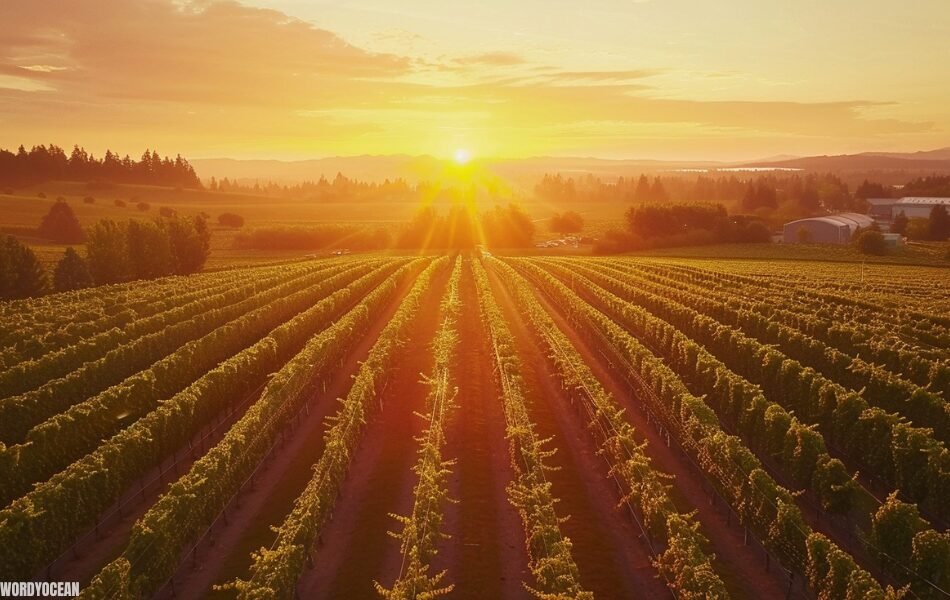The Innovative Unprg – l ingeniero agrónomo Escurra Clso

Imagine a world where sustainable farming practices not only enhance crop yields but also protect our environment for future generations. This vision is not just a dream; it is the driving force behind agricultural innovation, exemplified by professionals like Ingeniero Agrónomo Escurra Clso. His work highlights the crucial intersection of agriculture and sustainability, a topic increasingly vital to modern farming.Many individuals interested in agriculture grapple with questions about effective farming techniques, sustainability, and innovative practices that can enhance productivity while conserving resources. The challenge lies in sifting through the myriad of information available to find reliable, actionable insights. Understanding how to apply these practices effectively is key to transforming challenges into opportunities.
This article aims to delve into the expertise of Unprg – l ingeniero agrónomo Escurra Clso, showcasing how his methodologies address contemporary agricultural challenges. By exploring his insights, readers will gain a deeper understanding of how to implement innovative agricultural strategies that meet both economic and environmental goals.Agricultural engineers play a pivotal role in modern farming by integrating technology with sustainable practices. Ingeniero Agrónomo Escurra Clso stands out in this field, advocating for innovative approaches that respond to the pressing needs of today’s agricultural landscape. His contributions are particularly relevant as the sector faces challenges such as climate change, resource depletion, and the demand for increased food production.
The significance of these practices extends beyond individual farms; they contribute to broader environmental goals. As climate variability intensifies, the agricultural sector must adapt by adopting methods that mitigate risks associated with extreme weather conditions. Escurra’s emphasis on sustainability provides a roadmap for farmers to enhance resilience while promoting environmental stewardship.Ingeniero Agrónomo Escurra Clso also champions the integration of technology in agriculture. Precision agriculture, for instance, utilizes data analytics and technology to make informed decisions that optimize farming practices. By employing sensors, drones, and data management systems, farmers can monitor crop health, manage resources efficiently, and ultimately increase yields.
Understanding “Unprg – l ingeniero agrónomo Escurra Clso”
The term “unprg – l ingeniero agrónomo escurra clso” refers to a specific individual, Ingeniero Agrónomo Escurra Clso, associated with the Universidad Nacional de Piura (UNPRG) in Peru. This phrase encapsulates not only his name but also his professional identity as an agronomist. The significance of his work lies in the integration of agricultural science with sustainable practices, aimed at enhancing productivity while safeguarding the environment.
Unprg – l ingeniero agrónomo escurra clso , as a field, focuses on the science of soil management and crop production. It combines aspects of biology, ecology, and technology to develop effective farming techniques. The role of an agronomist like Escurra is pivotal, as they provide solutions to modern agricultural challenges through research, innovation, and the implementation of sustainable methods.
The evolution of agricultural engineering and agronomy has a rich history, particularly in regions like Peru where agriculture is a cornerstone of the economy. The rise of agronomists such as Escurra reflects a broader trend towards scientific approaches in farming, particularly as global food demands increase and environmental concerns intensify.
Historically, agronomists have played vital roles in improving crop varieties, developing irrigation systems, and introducing sustainable practices. The contributions of professionals like Ingeniero Agrónomo Escurra Clso represent a modern phase in this evolution, emphasizing the necessity for research-driven solutions that respond to both economic pressures and ecological considerations. His work illustrates a commitment to advancing agricultural methodologies that honor traditional practices while embracing innovation.
The Role and Importance of “Unprg – l ingeniero agrónomo Escurra Clso”
The contributions of “unprg – l ingeniero agrónomo escurra clso” are multifaceted and span various sectors within agriculture and environmental engineering. His work primarily focuses on sustainable agricultural practices, innovative crop management techniques, and research-driven solutions tailored to the challenges faced by farmers in Peru and beyond.
Unprg – l ingeniero agrónomo escurra clso has been instrumental in promoting precision agriculture, which leverages technology and data analysis to optimize resource use and enhance crop yields. This approach is critical in addressing issues such as soil degradation, water scarcity, and the impact of climate change on agricultural productivity. By advocating for practices such as soil conservation, integrated pest management, and crop diversification, Escurra has helped many farmers improve their operational efficiency and sustainability.
Additionally, unprg – l ingeniero agrónomo escurra clso his engagement with local communities emphasizes the importance of knowledge transfer. Through workshops, training sessions, and collaborative projects, Escurra empowers farmers with the skills and knowledge needed to implement these advanced techniques. His work not only enhances agricultural practices but also fosters community resilience and food security.
Benefits and Advantages
The benefits of adopting the principles espoused by “unprg – l ingeniero agrónomo escurra clso” are significant and wide-ranging. One of the primary advantages is increased agricultural productivity. By utilizing sustainable practices and innovative technologies, farmers can achieve higher yields while minimizing their environmental footprint. This dual focus on productivity and sustainability is essential for meeting the growing global demand for food.
Moreover, unprg – l ingeniero agrónomo escurra clso implement of precision agriculture techniques reduces waste and optimizes resource use, leading to cost savings for farmers. Efficient water management, for instance, not only conserves this vital resource but also lowers irrigation costs, thus enhancing overall profitability. Furthermore, the emphasis on sustainable practices contributes to soil health, ensuring long-term agricultural viability and resilience against climate change.
Escurra’s methodologies also promote biodiversity, which is crucial for ecosystem stability. By encouraging practices that support diverse crop systems, he aids in maintaining ecological balance and reducing dependency on chemical inputs, further enhancing environmental sustainability.
How to Implement or Use “Unprg – l ingeniero agrónomo Escurra Clso”
Step-by-Step Guide
Implementing the methodologies associated with “unprg – l ingeniero agrónomo escurra clso” requires a systematic approach that integrates sustainable practices into existing agricultural operations. The first step is to conduct a thorough assessment of current farming practices and identify specific challenges. Understanding the local environment, including soil conditions and climate factors, is crucial for tailoring solutions effectively.
Once the assessment is complete, the next step is to develop a customized action plan. This plan should outline the specific sustainable practices to be adopted, such as crop rotation, cover cropping, or precision irrigation. Engaging with local agronomic experts or agricultural extension services can provide valuable insights and recommendations tailored to the region.
After establishing a plan, the implementation phase begins. Start by introducing one or two new practices at a time to monitor their impact effectively. For example, if adopting precision irrigation, invest in the necessary equipment and training for staff to ensure proper usage. Continuous monitoring and data collection are essential during this phase to assess the effectiveness of the implemented practices and make adjustments as needed.
Finally, ongoing education and collaboration are vital. Regular workshops, training sessions, and peer networking can help farmers stay updated on best practices and innovations in sustainable agriculture, reinforcing the community’s collective knowledge base.
Best Practices
To achieve optimal results while implementing the strategies advocated by “unprg – l ingeniero agrónomo escurra clso,” several best practices should be considered. First, prioritize soil health by incorporating organic matter and avoiding excessive tillage, which can degrade soil structure. Conducting regular soil tests can inform decisions regarding nutrient management and amendments.
Second, fostering biodiversity is key. Planting cover crops and diverse crop rotations can enhance soil fertility and reduce pest pressure, creating a more resilient farming system. It is also beneficial to establish partnerships with local agricultural organizations or universities to share resources and knowledge.
Third, leverage technology wisely. Utilize tools such as soil moisture sensors or data management software to optimize resource usage and monitor crop health. These technologies can provide real-time insights that drive informed decision-making.
Lastly, maintain flexibility in your approach. Agricultural conditions can change rapidly due to factors such as weather events or market fluctuations. Being adaptable allows farmers to respond effectively to new challenges as they arise.
Tools or Resources
Several tools and resources can complement the methodologies of “unprg – l ingeniero agrónomo escurra clso.” For data management, software such as FarmLogs or Cropio can help farmers track field activities, monitor yields, and analyze environmental conditions. These platforms enable better decision-making through data-driven insights.
In addition, consider utilizing agricultural extension services offered by institutions like the Universidad Nacional de Piura (UNPRG). These services often provide access to research, training programs, and networking opportunities that can further enhance agricultural practices.
Furthermore, online resources and courses on sustainable agriculture can provide additional knowledge and skills. Platforms like Coursera or local agricultural organizations often offer relevant courses that delve into specific topics, from integrated pest management to soil health.
By effectively leveraging these tools and resources while following the outlined implementation steps, farmers can successfully integrate the innovative and sustainable practices championed by Ingeniero Agrónomo Escurra Clso, leading to improved agricultural outcomes and a more sustainable future.
Challenges and Considerations
Potential Difficulties
Implementing the methodologies of “unprg – l ingeniero agrónomo escurra clso” can present several challenges that farmers and agricultural professionals may encounter. One significant difficulty is the initial resistance to change from traditional farming practices. Many farmers may be accustomed to conventional methods and might hesitate to adopt new, sustainable techniques. This reluctance can stem from a lack of awareness about the benefits or fear of the perceived risks associated with new technologies.
Another challenge is the financial investment required for adopting advanced agricultural technologies. Precision irrigation systems, soil sensors, and data analytics software can demand substantial upfront costs. For smallholder farmers, these expenses may seem prohibitive, creating a barrier to entry for implementing innovative practices.
Additionally, unprg – l ingeniero agrónomo escurra clso varying levels of access to resources such as training, education, and technology can complicate the implementation process. Regions with limited agricultural support or infrastructure may struggle to effectively adopt the principles advocated by Escurra, hampering progress toward sustainable practices.
Risk Mitigation Strategies
To address these challenges, several risk mitigation strategies can be employed. First, fostering a culture of education and awareness is essential. Hosting community workshops and information sessions can help demonstrate the long-term benefits of sustainable practices, gradually overcoming resistance to change. Engaging local agricultural experts to share success stories can further inspire farmers to consider innovative approaches.
Financial assistance programs can also alleviate the burden of initial costs. Governments, NGOs, and agricultural cooperatives can offer grants, low-interest loans, or subsidies to support farmers in transitioning to sustainable technologies. Creating partnerships between farmers and technology providers can lead to shared investments, making advanced tools more accessible.
Additionally, unprg – l ingeniero agrónomo escurra clso implement pilot projects can serve as a valuable strategy. By starting with small-scale trials of new practices or technologies, farmers can evaluate their effectiveness without committing significant resources. Successful pilot projects can then be scaled up, providing tangible evidence of the benefits associated with adopting new methods.
Ethical Implications
The use of “unprg – l ingeniero agrónomo escurra clso” raises important ethical considerations. One significant concern is the potential impact of technology on traditional farming practices and local communities. While innovative methods can enhance productivity and sustainability, they may also disrupt established farming cultures and practices. It is crucial to balance the introduction of new technologies with respect for local knowledge and traditions, ensuring that community voices are heard in the decision-making process.
Another ethical implication involves the environmental impact of agricultural practices. As farmers adopt new technologies, there is a responsibility to ensure that these practices do not contribute to further ecological degradation. The emphasis on sustainable methods, as promoted by Escurra, must be accompanied by a commitment to environmental stewardship, maintaining biodiversity, and protecting natural resources.
Furthermore, the equitable distribution of resources and technology must be a priority. Ensuring that smallholder farmers have access to the same advancements as larger agricultural operations is essential for fostering inclusive growth and preventing disparities in agricultural success. The ethical obligation to support all members of the farming community is a critical aspect of implementing the practices associated with Ingeniero Agrónomo Escurra Clso.
By recognizing and addressing these challenges and ethical considerations, stakeholders can better navigate the complexities of sustainable agriculture, ensuring that the implementation of innovative practices is both effective and responsible.
Conclusion
In exploring “unprg – l ingeniero agrónomo escurra clso,” we have delved into the significance of his contributions to sustainable agriculture and innovative farming practices. We examined how his methodologies encompass a range of applications, from precision agriculture to community engagement, emphasizing the need for environmentally responsible practices that enhance productivity. The potential challenges associated with implementing these methods were discussed, along with effective strategies to overcome resistance and financial barriers. Furthermore, ethical implications were highlighted, underscoring the importance of respecting local traditions and ensuring equitable access to technological advancements.
As you reflect on the insights shared in this discussion, consider taking actionable steps in your own agricultural practices or projects. Whether you are a farmer, a student of agriculture, or simply interested in sustainability, conducting further research into the methodologies of Ingeniero Agrónomo Escurra Clso can deepen your understanding. Seek professional advice from local agricultural experts to identify tailored solutions that address your specific challenges. Implementing these innovative practices can not only improve your operational efficiency but also contribute to a more sustainable agricultural future.
The work of “unprg – l ingeniero agrónomo escurra clso” represents a vital intersection of tradition and innovation in agriculture. By embracing sustainable practices and leveraging modern technology, we can pave the way for a resilient and productive agricultural sector. The journey towards sustainable farming is one that requires collaboration, education, and a commitment to ethical stewardship of our natural resources. As we face the pressing challenges of food security and environmental degradation, the principles espoused by Escurra serve as a guiding light, encouraging us to rethink our approaches and foster a more sustainable future for generations to come.
FAQs
Q: What does “unprg – l ingeniero agrónomo escurra clso” refer to?
A: “Unprg – l ingeniero agrónomo escurra clso” refers to Ingeniero Agrónomo Escurra Clso, a professional associated with the Universidad Nacional de Piura in Peru. His work focuses on integrating sustainable agricultural practices with innovative techniques to enhance productivity while safeguarding the environment.
Q: What are the key applications of “unprg – l ingeniero agrónomo escurra clso”?
A: The contributions of Ingeniero Escurra are utilized in various sectors, particularly in promoting sustainable agricultural practices and precision agriculture. His methodologies aim to improve crop management, resource optimization, and community engagement, ultimately enhancing agricultural efficiency and sustainability.
Q: What benefits can be achieved through the use of “unprg – l ingeniero agrónomo escurra clso”?
A: The adoption of Escurra’s practices can lead to increased agricultural productivity, cost savings through optimized resource use, and enhanced soil health. Additionally, these practices promote biodiversity and contribute to long-term environmental sustainability, making farming operations more resilient to climate change.
Q: Can you provide examples of real-world applications of “unprg – l ingeniero agrónomo escurra clso”?
A: One example involves a collaborative project in the Piura region where local farmers implemented agroecological practices under Escurra’s guidance, resulting in a 30% increase in crop yields. Another case involved the adoption of precision irrigation technology, which reduced water usage by 40% while increasing productivity for water-intensive crops like tomatoes.







